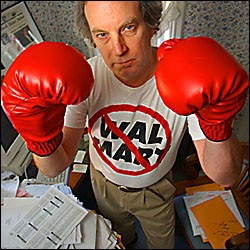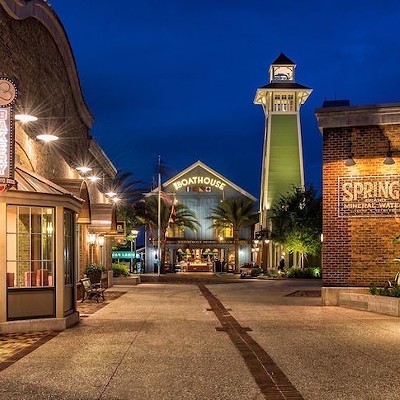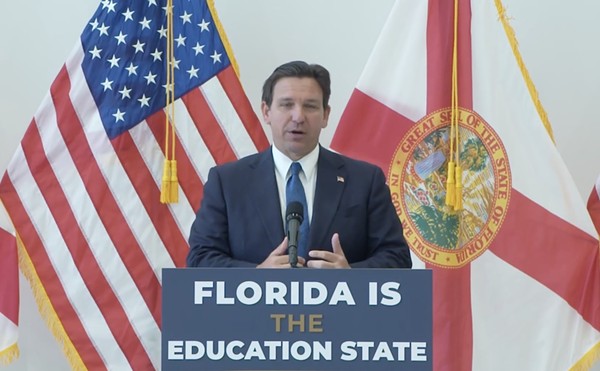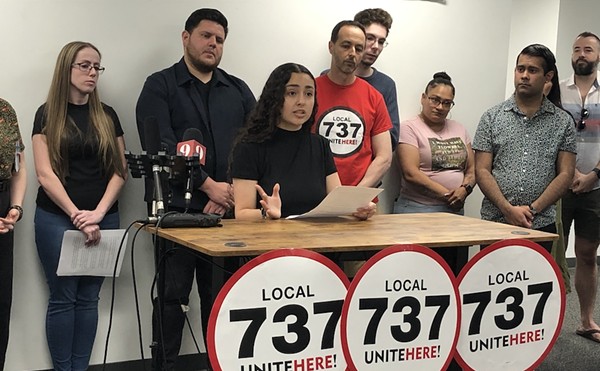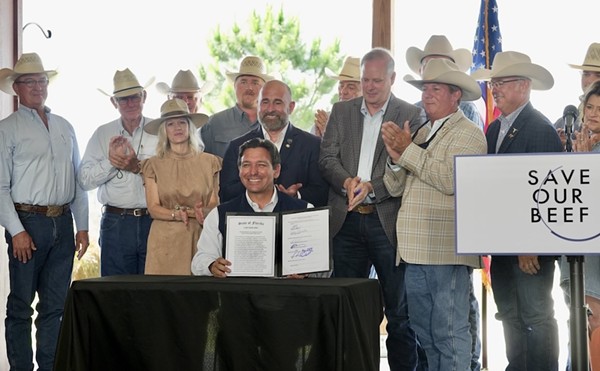For every acre paved, another will be saved. It sounds like a mantra for green business, a lullaby for the shopper with a troubled conscience. For the first time, a mammoth corporation has pledged to conserve wildlife habitat equivalent to the acreage it develops.
But the company launching the program isn't Patagonia or Greater Goods. It's Wal-Mart.
On April 12, 2005 – 10 days before Earth Day – Wal-Mart ads in at least 20 major American newspapers trumpeted the dawn of a new conservation program called Acres for America. The idea is that for every U.S. acre that Wal-Mart Inc. has developed or will develop over the next 10 years, the company will conserve an acre of high-priority wildlife habitat through its partnership with the nonprofit National Fish and Wildlife Foundation. Wal-Mart has pledged $35 million for the program and promised to conserve at least 138,000 acres, its estimated domestic "footprint." But the five signature projects announced on April 12 more than double that amount, allotting $8.8 million in Wal-Mart funds to conserve 321,000 acres.
The campaign has the federal government ga-ga with praise. NFWF chairman Max Chapman gushes that Wal-Mart is "raising the bar on conservation," and Secretary of the Interior Gale Norton calls Acres for America a model for other companies to emulate. Wal-Mart CEO Lee Scott enthuses, "Protecting the environment is simply the right thing to do."
But some environmentalists are suspicious of the company's motives. An April 12 Sierra Club press release noted that in recent years, Wal-Mart has agreed to pay $8.6 million in civil penalties to settle lawsuits over the company's alleged Clean Water Act violations. In addition, Sierra Club notes, Wal-Mart often paves over large open spaces and contributes to urban sprawl. "Wal-Mart thinks it can paint over its record with a nice shade of green, but that won't hide its true colors," says Sierra Club anti-sprawl campaign manager Eric Olson.
Wal-Mart spokeswoman Tara Stewart says that Acres for America is the company's gift to future generations. Skeptics say the campaign is nothing more than a public relations ploy to spruce up the company's tarnished public image.
GREENWASHING
Wal-Mart is the world's largest corporation, with a 2004 revenue of more than $288 billion, according to Fortune magazine. By comparison, Target had a 2004 revenue of about $50 billion; Costco, $48 billion; and Safeway, $36 billion. If Wal-Mart were a country, it would be the 29th richest in the world, topping Saudi Arabia, Colombia and Switzerland.
But the company's profits are starting to wilt just a little. In the past, Wal-Mart has actually benefited during economic recessions by drawing cash-strapped Americans to its discount stores. Now, the company seems to have fallen off the gravy train. Wal-Mart's first-quarter report for 2005 shows profits up 14 percent, but its sales growth fell short of expectations by two cents per share, and the company warned that profits might miss forecasts for the second quarter as well. In late April, Wal-Mart stock hit a 4.5-year low.
That was enough to put financial analysts in a tizzy. As John Dicker writes in his 2005 book, The United States of Wal-Mart, the company's monthly sales figures are now "an economic barometer unto themselves." A.G. Edwards retail analyst Robert Buchanan attributed the Wal-Mart sag, in part, to low company morale. Other analysts blamed cluttered stores, uncool merchandise, poor service and a bad public image after years of negative publicity from labor and community activists.
The company has gotten the most media flak for its union-busting labor practices, gender discrimination and sweatshop suppliers, but it's also under fire for its environmental impacts. Not helping matters for the company are investigative documentaries like Frontline's "Is Wal-Mart Good for America?" and Wal-Mart: The High Cost of Low Price, to be released by muckraking filmmaker Robert Greenwald Nov. 13.
Bob Bussel, director of the University of Oregon Labor Education and Research Center, recently did a little test: He asked a class of about 30 college students whether any of them avoided Wal-Mart because of its unethical practices. Six students raised their hands. If the class is any indication of the population at large, Wal-Mart's bad behavior could be costing it 20 percent of its potential customers.
Cue Acres for America. The campaign uses images of cute, fuzzy creatures to send a clear message to would-be Wal-Mart shoppers with an environmental conscience: Wal-Mart is good for the environment. The campaign puts environmentalists in a quandary. Yes, Wal-Mart sucks, they say, but isn't conservation by any means a good thing?
Lefty blogs buzzed about it. On www.dailykos.com, a progressive chat forum, a blogger named "chris at organicmatter" wrote, "I have my doubts about Wal-Mart's motives, `but` it's important to recognize when a company does something positive."
Another blogger, "fragamemnon," countered, "You can't pretty up a pig with lipstick … Wal-Mart, through its demand for low-cost goods, has worsened the global environment by forcing suppliers to manufacture in countries with lax environmental policies."
Regardless, noted "christine in nj," the Acres for America contribution is a drop in the bucket of the company's revenue. The corporation pulls in roughly $33 million in sales every hour. "Sorry," she wrote. "I can't get excited."
GOOD FOR THE ENVIRONMENT
Hearing its spin doctors at work, you'd think Wal-Mart was the best thing that's happened for the environment since trees.
Spokeswoman Stewart says that in 2004, Wal-Mart Inc. recycled more than 2.8 million tons of waste. (She couldn't say how much waste Wal-Mart produces annually.) Since 2001, Wal-Mart has participated in the National Parks America Tour, a volunteer-driven initiative to put more than 10,000 work hours into park projects. (Wal-Mart contributes by encouraging its employees to participate – unpaid.) And Wal-Mart requires construction firms bidding on Wal-Mart contracts to certify their project managers in storm water management. (This is a smart move, given that Wal-Mart has spent millions of dollars to settle alleged Clean Water Act violations for polluted storm water runoff from its parking lots.) "We're excited to be able to say, ‘Storm water is zero tolerance for us,'" she says.
Stewart paints a portrait of Wal-Mart in bright greens and gold dust, denying that the Acres for America campaign is a PR counterattack to negative publicity. "The Acres for America program is designed … to let people know that we care," she says cheerily. "We want folks to understand that Wal-Mart is good for the environment."
BAD FOR THE ENVIRONMENT
In The Case Against Wal-Mart, Al Norman, founder of the national Wal-Mart ball-busting organization Sprawl Busters, unfurls a litany of Wal-Mart's environmental misdeeds. Among them: Pesticides and fertilizers stored on Wal-Mart parking lots across Connecticut created storm water runoff that polluted the state's streams and rivers, leading state officials to call Wal-Mart "a serious statewide polluter." In 2001, Wal-Mart settled charges of violating the Clean Air Act at construction sites in four Southwestern states, and in 2004, the company settled charges of illegally selling refrigerators with chlorofluorocarbons (CFCs) at Sam's Clubs.
Wal-Mart's developers frequently choose to build on sensitive sites such as wetlands, lakes, Native American burial grounds and wildlife preserves, Norman says. Making matters worse is that much of the environmentally destructive development is for nothing. Wal-Mart has a habit of closing its discount stores in order to build larger Supercenters that turn more profit, Norman says. Wal-Mart has abandoned about 356 U.S. buildings and their parking lots, totaling 52 million square feet, or more than 1,000 football fields, of unused space.
In that context, Norman says, the Acres for America is too little, too late. "This is like trying to cover up a smell with perfume," Norman says. "I don't think it works too well with Wal-Mart, because the odor of bad ethics keeps coming through."
Norman compares the Acres for America campaign to Wal-Mart's other goodwill gestures – gifts to the Children's Miracle Network, college scholarships for African Americans, the Teacher of the Year Award. He calls it "cause-related marketing" or, more bluntly, "loud giving."
Still, Norman doesn't knock the Acres for America program itself. "If they're going to give some land anywhere, fine; we'll take it," he says. "It's like a war reparation. This is not a company that cares about the land or natural resources. They have one of the worst track records in terms of the environment of all the corporations in America."
Norman admits that Wal-Mart isn't the only bad guy; he says that other big box chains such as Target, Home Depot and Lowe's are also guilty of environmental crimes. The big box prototype, a sprawling single-level store that lays waste to open space, is an environmental disaster, he says. "The only thing that makes Wal-Mart the No. 1 offender is that they're putting up more buildings than any other company in America. The other companies are not exonerated; they're just Wal-Mart lite."
American shoppers aren't off the hook, either. Consumption fuels the Wal-Mart beast. "There are two things Americans do in excess: Eat and shop," Norman says. "I relate excess consumption to empty lives. The more our communities are torn apart, the less we talk to our neighbors, the more we fill our shelves up with junk that ends up in the landfills. And Wal-Mart, with the support of the White House, is encouraging people to go out and shop."
SNEAKY SCHEMES
Any way you look at it – as a model corporate gesture or a shady corporate scheme – the Acres for America campaign is smart. It's as if a Wal-Mart PR executive wanted to amend the opening line of Dicker's book: "Unless you've been residing in a national wildlife refuge, you probably hear a lot about Wal-Mart."
Bussel sees the Acres for America campaign as an attempt to divide the political left, which has been largely united against Wal-Mart for its poor labor and environmental practices. He says that by appealing to environmentalists, the company is attempting to shake up the sense of "green" solidarity with the "blue" pro-labor movement. "Wal-Mart has a real sense of divide and conquer," he says. "From a strategic point of view, `Acres for America` is a clever move on Wal-Mart's part. But people have to recognize that they're dealing with a very sophisticated company that is under fire because of its policies."
Norman agrees, relating the Acres for America campaign to the company's strategies of featuring African Americans in their marketing and underwriting programs for National Public Radio. "They're clearly going into areas of the American culture that are not naturally allies of corporate greed to do some disorganization and put out disinformation," Norman says. "They're trying to buy goodwill. It's part of an elaborate bribe."
One of Acres for America's signature projects is the conservation of 1,120 acres of wildlife habitat along Squaw Creek, a tributary of the Deschutes River in central Oregon. The Deschutes Basin Land Trust will use funds from the NFWF and Wal-Mart to purchase a conservation easement on a private ranch, which will conserve fish and wildlife habitat while allowing ranch operations to continue. The easement is a part of the land trust's Back to Home Waters program, which aims to reintroduce salmon and steelhead runs to streams they've been absent from since the construction of dams on the Deschutes 40 years ago. Wal-Mart's share of the $1.35 million easement is $400,000.
Bend resident Michael Funke says that the Squaw Creek conservation project sounds great, but the timing is suspect. Hundreds of Bend-area locals have been organizing for months against a proposed Wal-Mart Supercenter in north Bend that would sit smack between two existing Wal-Marts in south Bend and Redmond. Funke leads a citizen-powered movement called Our Community First, founded in February to oppose the proposed Supercenter.
Funke points to a 2004 study released by Rep. George Miller, D-Calif., that finds that the average Wal-Mart store employing 200 people costs taxpayers more than $420,000 a year in the form of state and federal assistance for low-wage workers – welfare, housing assistance, Medicaid and food stamps. By Funke's calculations, Wal-Mart's $400,000 share in the Squaw Creek easement comes up short of the estimated $840,000 tax burden of the existing and proposed Bend stores. "They still owe us more money!" he says.
Money is not all he thinks Wal-Mart owes the people of Central Oregon, where the unofficial slogan is "Poverty with a View." "If you really want to help our community," Funke says, hypothetically addressing the Wal-Mart upper management, "raise wages. Channel your money back to our community rather than to `company headquarters in` Arkansas or suppliers in China."
In Funke's opinion, the Acres for America program is a welcome gesture, but it's not indicative of an environmentally conscious corporation. "I don't think we should get caught up in the idea that Wal-Mart is all of a sudden interested in the environment," he says. "What it's interested in is its reputation."
A version of this story originally appeared in the Eugene Weekly

